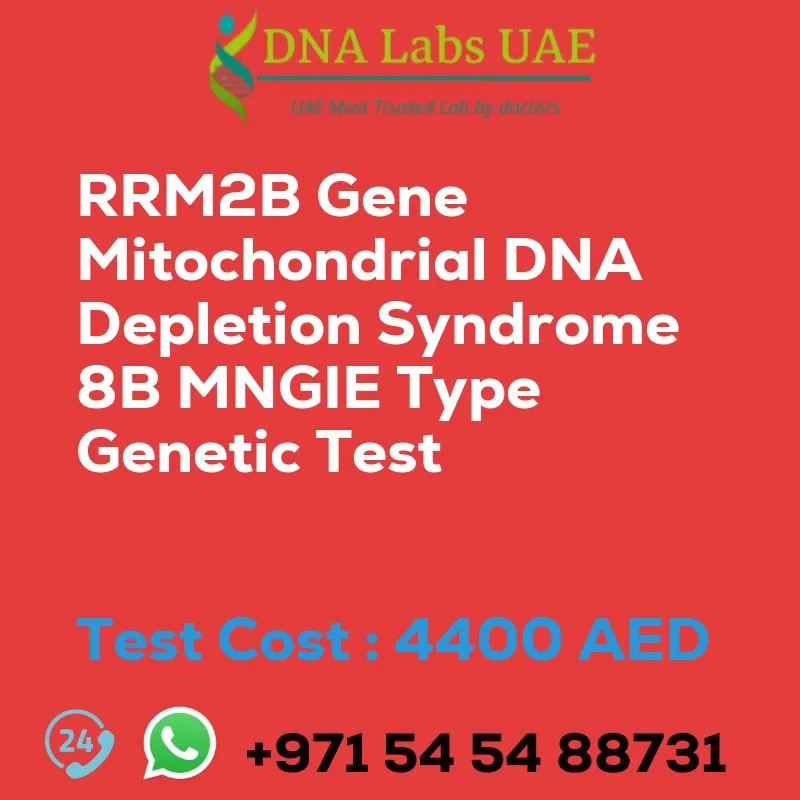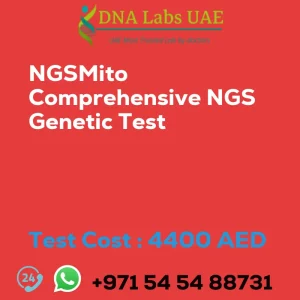RRM2B Gene Mitochondrial DNA depletion syndrome 8B MNGIE type Genetic Test
Test Name: RRM2B Gene Mitochondrial DNA depletion syndrome 8B MNGIE type Genetic Test
Components: Blood or Extracted DNA or One drop Blood on FTA Card
Price: 4400.0 AED
Sample Condition: Blood or Extracted DNA or One drop Blood on FTA Card
Report Delivery: 3 to 4 Weeks
Method: NGS Technology
Test type: Neurological Disorders
Doctor: Neurologist
Test Department: Genetics
Pre Test Information: Clinical History of Patient who is going for RRM2B Gene Mitochondrial DNA depletion syndrome 8B, MNGIE type NGS Genetic DNA Test. A Genetic Counselling session to draw a pedigree chart of family members affected with RRM2B Gene Mitochondrial DNA depletion syndrome 8B, MNGIE type.
Test Details
The RRM2B gene is associated with a condition called Mitochondrial DNA depletion syndrome 8B, MNGIE type. This syndrome is characterized by a progressive loss of mitochondrial DNA, leading to a variety of symptoms including muscle weakness, gastrointestinal issues, and neurological problems.
NGS Genetic Test refers to Next-Generation Sequencing Genetic Test, which is a high-throughput sequencing technology used to analyze multiple genes simultaneously. In the context of RRM2B gene and Mitochondrial DNA depletion syndrome 8B, MNGIE type, an NGS Genetic Test can be used to detect any mutations or variations in the RRM2B gene that may be causing the syndrome.
The test involves extracting DNA from a patient’s blood or tissue sample and sequencing the RRM2B gene using NGS technology. The obtained sequence data is then compared to a reference sequence to identify any genetic changes or mutations. By identifying specific mutations in the RRM2B gene, the NGS Genetic Test can help in confirming a diagnosis of Mitochondrial DNA depletion syndrome 8B, MNGIE type.
It can also be useful for genetic counseling and providing information about the risk of passing the condition to future generations. Additionally, NGS Genetic Testing can aid in the development of personalized treatment plans and monitoring the progression of the disease.
| Test Name | RRM2B Gene Mitochondrial DNA depletion syndrome 8B MNGIE type Genetic Test |
|---|---|
| Components | |
| Price | 4400.0 AED |
| Sample Condition | Blood or Extracted DNA or One drop Blood on FTA Card o |
| Report Delivery | 3 to 4 Weeks |
| Method | NGS Technology |
| Test type | Neurological Disorders |
| Doctor | Neurologist |
| Test Department: | Genetics |
| Pre Test Information | Clinical History of Patient who is going for RRM2B Gene Mitochondrial DNA depletion syndrome 8B, MNGIE type NGS Genetic DNA Test A Genetic Counselling session to draw a pedigree chart of family members affected with RRM2B Gene Mitochondrial DNA depletion syndrome 8B, MNGIE type |
| Test Details |
The RRM2B gene is associated with a condition called Mitochondrial DNA depletion syndrome 8B, MNGIE type. This syndrome is characterized by a progressive loss of mitochondrial DNA, leading to a variety of symptoms including muscle weakness, gastrointestinal issues, and neurological problems. NGS Genetic Test refers to Next-Generation Sequencing Genetic Test, which is a high-throughput sequencing technology used to analyze multiple genes simultaneously. In the context of RRM2B gene and Mitochondrial DNA depletion syndrome 8B, MNGIE type, an NGS Genetic Test can be used to detect any mutations or variations in the RRM2B gene that may be causing the syndrome. The test involves extracting DNA from a patient’s blood or tissue sample and sequencing the RRM2B gene using NGS technology. The obtained sequence data is then compared to a reference sequence to identify any genetic changes or mutations. By identifying specific mutations in the RRM2B gene, the NGS Genetic Test can help in confirming a diagnosis of Mitochondrial DNA depletion syndrome 8B, MNGIE type. It can also be useful for genetic counseling and providing information about the risk of passing the condition to future generations. Additionally, NGS Genetic Testing can aid in the development of personalized treatment plans and monitoring the progression of the disease. |








